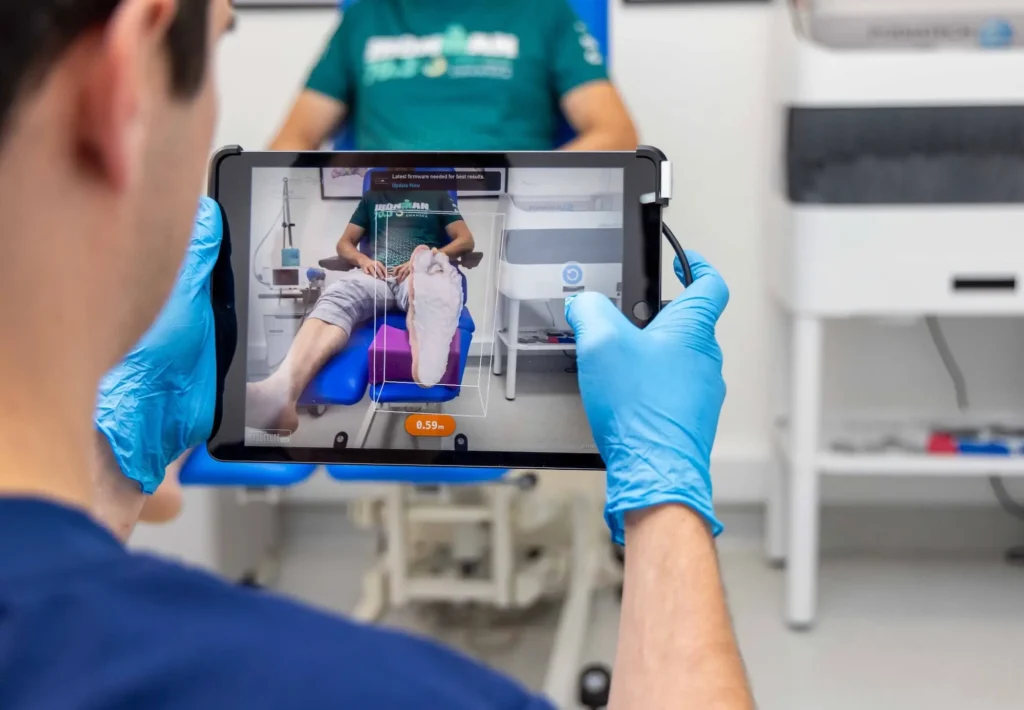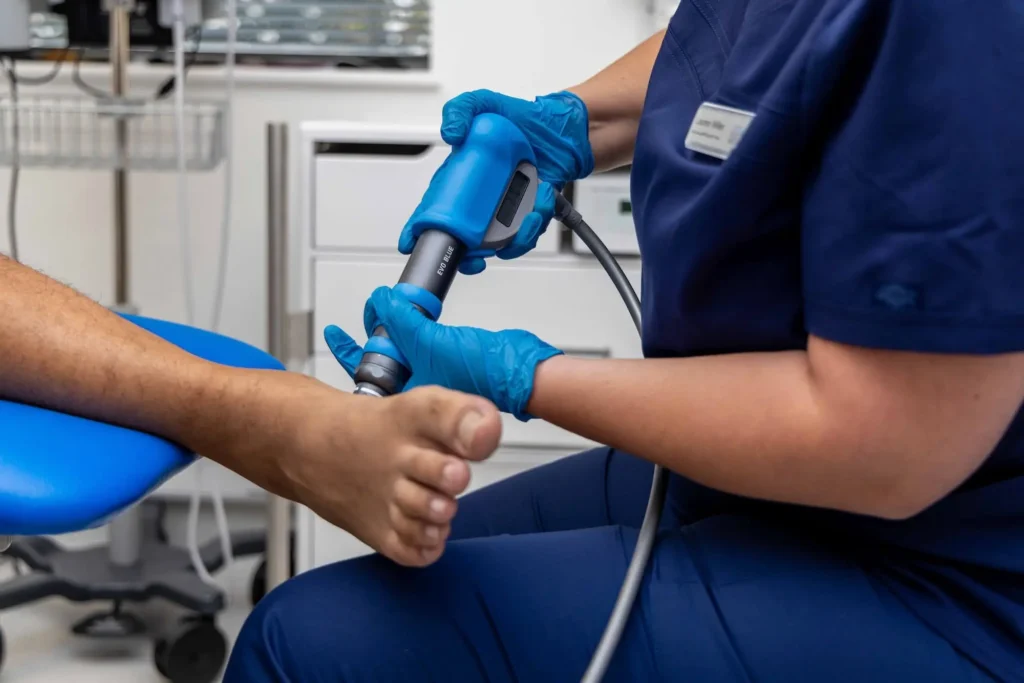PLANTAR FASCIITIS
Conquer the pain of plantar fasciitis with our expert podiatric care. Step into comfort with our tailored treatments and dedicated support to get you back on your feet, pain-free.

Services
WHAT IS PLANTAR FASCIITIS?
Plantar Fasciitis is a common yet often misunderstood foot ailment characterised by a sharp, stabbing pain that typically occurs in the heel and/or arch of the foot. It stems from trauma of the plantar fascia, a thick band of tissue that runs along the bottom of your foot, connecting your heel bone to your toes and creating your foot’s arch.
This discomfort is most pronounced with your first steps in the morning or after prolonged periods of sitting or standing, and can seemingly come out of nowhere to hinder your daily activities. Often the result of repetitive stress and strain, plantar fasciitis can afflict anyone but is most frequently found in runners, individuals who stand for long periods of time, and those wearing shoes with inadequate support or cushioning.
At MyFootMedic, we understand how plantar fasciitis can limit your lifestyle. Our experienced team are here to offer expert diagnosis, advice, and treatment tailored to restore your feet to their natural, pain-free state.
WHAT CAUSES PLANTAR FASCIITIS?
- Repetitive Stress: Engaging in activities that place a lot of stress on the heel—like long-distance running, jumping, or ballet dancing—can initiate micro-tears in the fascia.
- Improper Footwear: Wearing shoes that don’t provide adequate support or cushioning can increase the risk of developing plantar fasciitis, especially if you have high arches or flat feet.
- Excess Weight: Carrying extra body weight puts additional stress on the plantar fascia, often leading to inflammation and pain over time.
- Occupational Hazards: Jobs that require you to be on your feet for long periods, particularly on hard surfaces, can contribute to strain on your plantar fascia.
- Age: As we age, the plantar fascia loses some of its elasticity and becomes more susceptible to irritation. Plantar fasciitis is most common in people between the ages of 25 and 65.
- Foot Mechanics: Abnormal walking patterns can create undue tension in the plantar fascia, leading to plantar fasciitis.
At MyFootMedic, we assess all these potential causes when evaluating your foot pain. Our goal is to not only treat the pain but to address the underlying issue, ensuring long-term relief and foot health.

HOW CAN PLANTAR FASCIITIS BE TREATED?
At MyFootMedic, we believe in a multifaceted approach to treating plantar fasciitis, with strategies designed to alleviate pain and prevent recurrence. Our treatments focus on reducing inflammation, healing the fascia, supporting the fascia, and correcting any biomechanical issues that might contribute to plantar fasciitis. Here’s how we can tackle it together:
Orthotics/Insoles
Personalised insoles can redistribute pressure on your feet to relieve stress on the plantar fascia.
Exercises:
We provide guided stretches and exercises designed to strengthen the plantar fascia, Achilles tendon, and lower leg muscles, enhancing foot stability and flexibility.
Shockwave Therapy:
Non-invasive shockwave therapy can promote tissue healing and pain relief for plantar fasciitis cases.
Lifestyle Changes:
Small adjustments in your daily life, such as reducing time spent on hard surfaces and selecting proper footwear, can have a significant impact.
Medication:
In some cases, anti-inflammatory medicines are recommended to reduce pain and swelling.
Ultrasound Imaging:
We are able to offer point of care ultrasound imaging for further assessment of the Plantar Fascia.
Steroid Injections:
For persistent cases, we can offer treatments such as ultrasound guided corticosteroid injections.
Rest assured, our team at MyFootMedic are dedicated to helping you reclaim your mobility and enjoy life without the nagging heel pain plantar fasciitis brings. Let us guide you toward lasting relief with tailored treatments and compassionate care.
LET’S ANSWER YOUR PLANTAR FASCIITIS QUESTIONS!
While mild cases of plantar fasciitis can improve with time, self-healing may not be as straightforward as it sounds. The body has innate healing mechanisms, but without addressing the contributing factors—such as improper footwear, overuse, or inadequate foot structure—the healing process can be prolonged or incomplete, potentially leading to chronic heel pain or recurring symptoms.
Plantar fasciitis is often confused with other causes of heel pain, due to the overlap in symptoms. One common condition mistaken for plantar fasciitis is Achilles tendonitis, which affects the tendon connecting the calf muscles to the heel. Another is tarsal tunnel syndrome, a compression of the nerve inside the ankle, which can also cause heel discomfort.
It’s also important to distinguish plantar fasciitis from fat pad atrophy, a thinning of the protective cushioning under the heel. At MyFootMedic, our expert team uses a comprehensive approach to accurately diagnose your condition, ensuring that you receive the most effective treatment for your specific foot concern.
Many patients wonder whether plantar fasciitis is a type of arthritis. It is important to clarify that plantar fasciitis is not a form of arthritis.
On the other hand, plantar fasciitis is a condition involving damage of the plantar fascia—a thick band of tissue that runs across the bottom of the foot and connects the heel bone to the toes. While both conditions can result in discomfort and restrict mobility, they have different underlying causes and treatment approaches.
While complete rest may provide temporary relief, it’s generally not the best long-term solution. Prolonged inactivity can weaken the plantar fascia and surrounding muscles, leading to slower healing.
Plantar fasciitis, characterised by sharp pain in the heel or the arch of the foot, can indeed become severe enough to impact your ability to walk. This painful condition results from strain and inflammation of the plantar fascia, the connective tissue that supports the arch of your foot.
In cases where the condition has not been given proper attention or treatment, the persistent strain on the plantar fascia can lead to chronic pain that may hinder daily activities, including walking. It’s crucial for individuals experiencing signs of plantar fasciitis to seek medical advice early on.
Treatments such as physical therapy, orthotics, anti-inflammatory medications, and in some cases, more advanced interventions, can prevent the condition from reaching a disabling severity. Rest and proper foot support can alleviate symptoms before they progress to a debilitating stage. A podiatrist can provide personalised treatment plans to address and manage the pain effectively, aiming to restore normal foot function and improve quality of life.
PLANTAR FASCIITIS TREATMENTS IN BEDFORD WITH MY FOOT MEDIC.
Living with plantar fasciitis can be challenging, but you don’t have to endure the pain alone. At MyFootMedic, we’re committed to helping you overcome this condition and regain your active lifestyle. Our comprehensive approach to diagnosis and treatment ensures that you receive personalised care tailored to your specific needs.
If you’re experiencing persistent heel pain, particularly in the morning or after periods of rest, it’s time to take action. Don’t let plantar fasciitis hold you back from enjoying your daily activities or pursuing your passions.
Don’t wait for the pain to worsen. Take the first step towards healthier, happier feet today. Our friendly team are standing by to answer your questions and help you start your path to recovery. At MyFootMedic, we’re not just treating your feet; we’re helping you walk confidently into a pain-free future. Contact us now and let’s conquer plantar fasciitis together!









